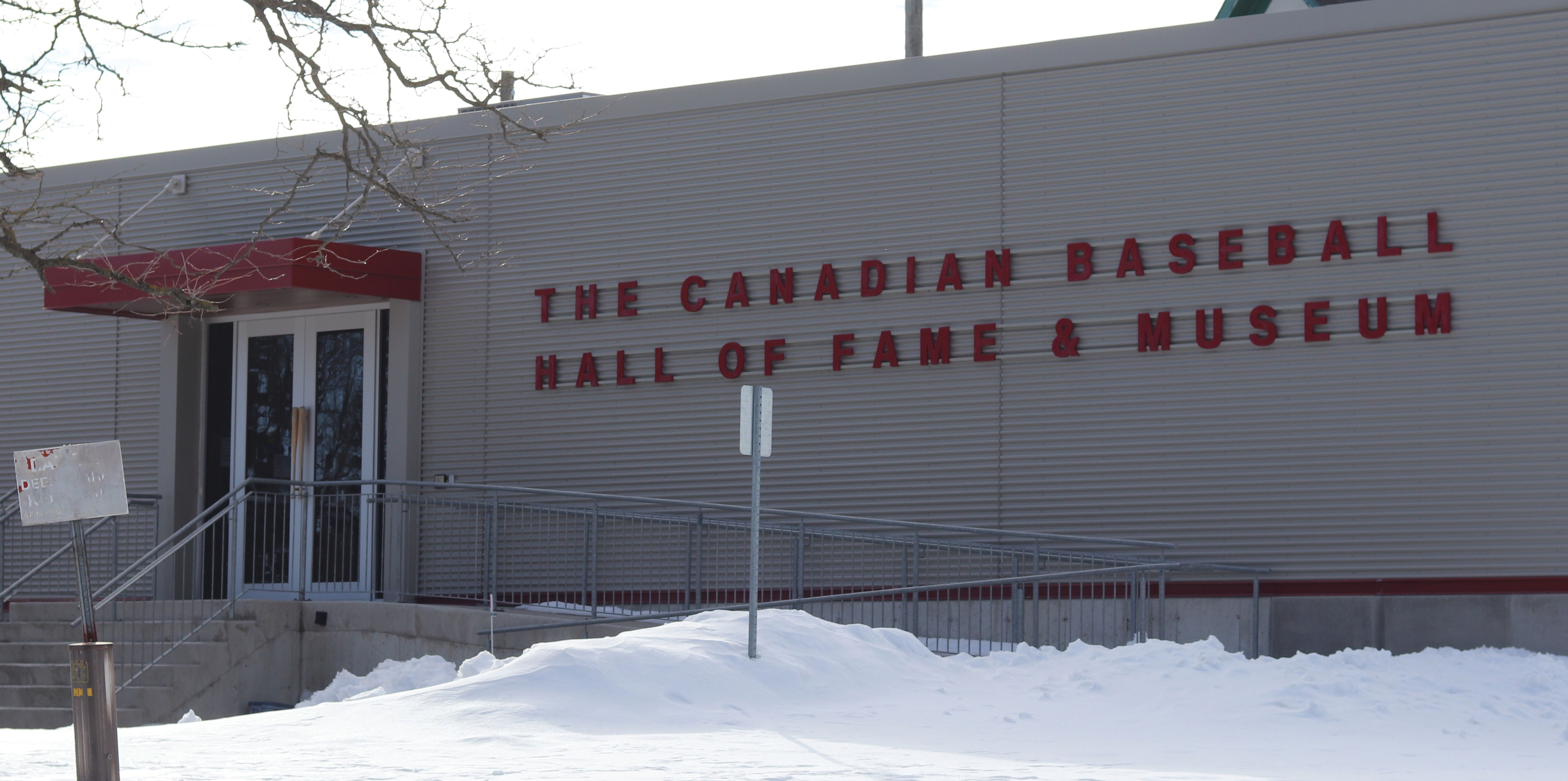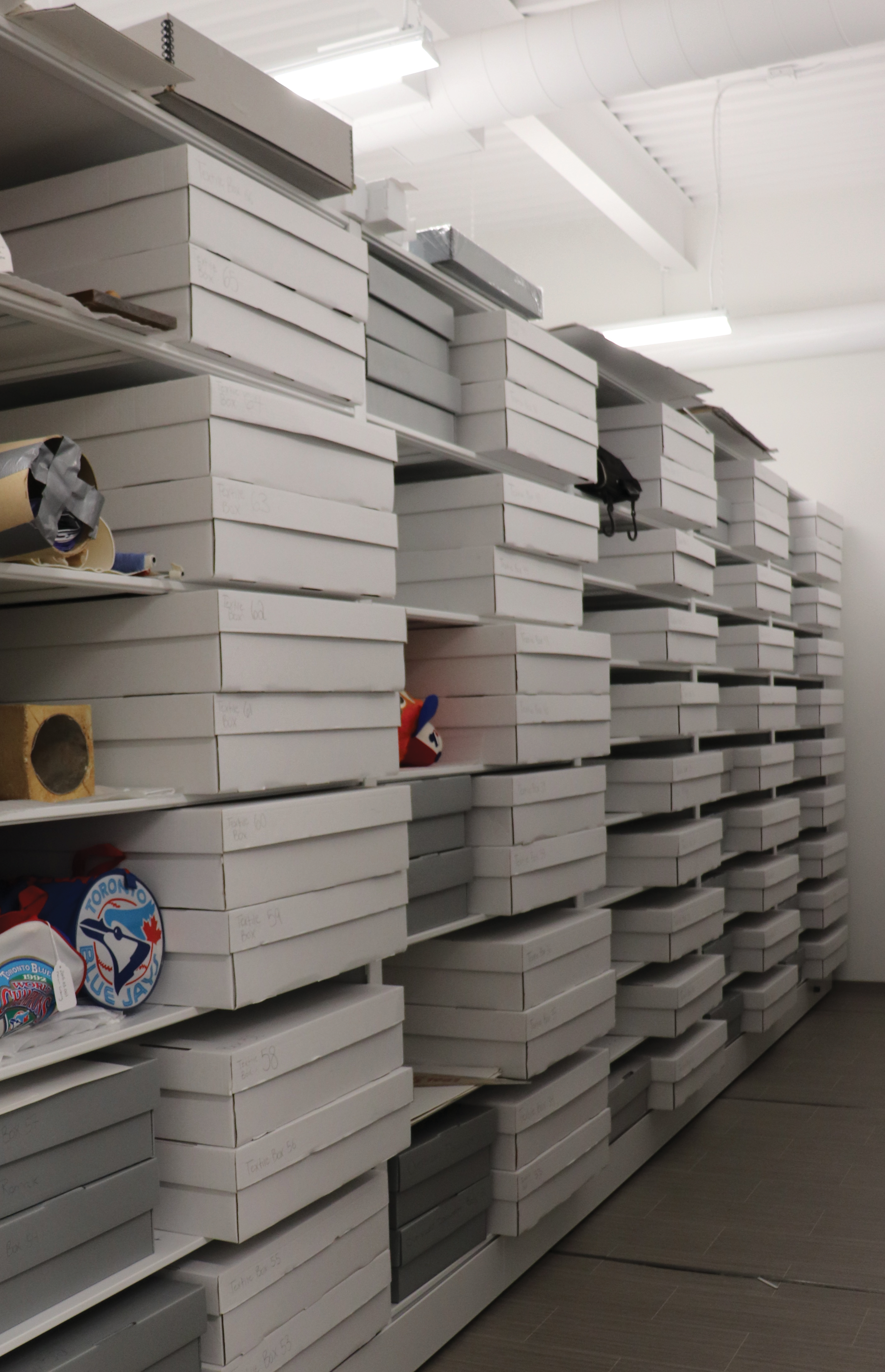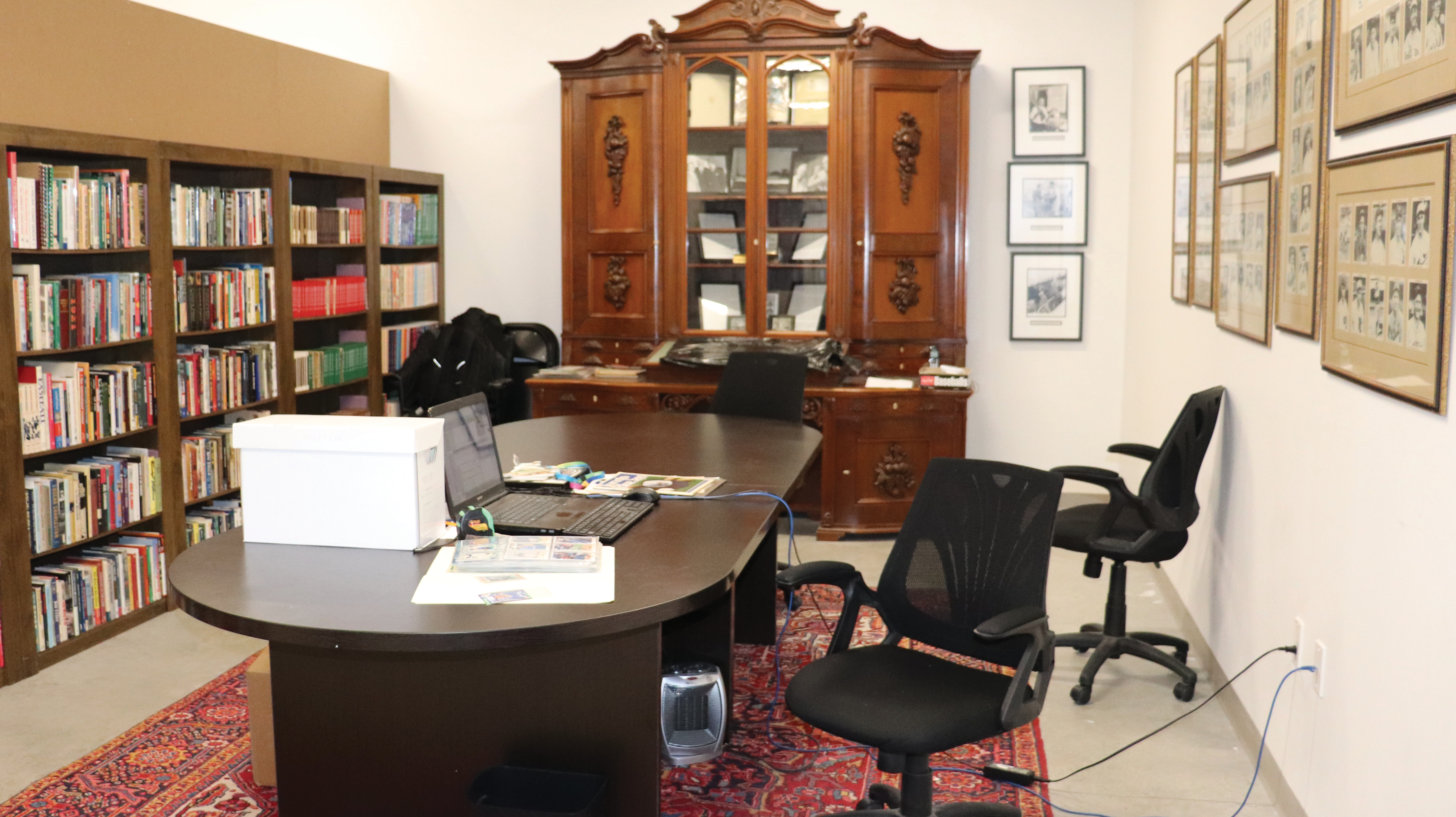YCW and the Benefits of Hiring “From Away”
Nathan Sells and Gareth Hedges

The Canadian Baseball Hall of Fame in St. Mary’s, Ontario.
For Young Canada Works (YCW) positions, the whole nation is your oyster, but are you making the best use of it?
YCW helps youth across the country gain new life experiences working in museums and other heritage institutions as they progress in their education and career goals. While travel is not an essential component of YCW jobs, the program can help reimburse participants for their travel costs when relocating more than 125km from their primary residence to take jobs. This allows young Canadians to do anything from working in a historic lighthouse on Grand Manan Island in New Brunswick to working in a historic town in the wilds of British Columbia, and everything in between!

Archival shelves. Photo — Canadian Baseball Hall of Fame.
After diminishing over the course of the COVID-19 pandemic, traveling participants in the Young Canada Works in Heritage Organizations (YCW HO) stream doubled in the 2022-2023 program cycle. Young Canada Works at Building Careers in Heritage (YCW BCH) also saw a significant increase in intern travel this year. Which is why this is a great opportunity to review the benefits involved in traveling for work in heritage, while showcasing successful recruitment and accommodation strategies.
Recruiting
Many successful YCW employers have found travel-eligible candidates by posting on national job boards, through their professional networks, and by connecting with universities across the country. Dr. Sarah Newstead of the Atlas Coal Mine Historical Society explains, “as we recruit from across Canada to a very small/remote town in Alberta, we need to start recruitment incredibly early each year. We target mostly students through local job boards, university job boards (strategically throughout Canada), our website/social media and some more generalized job services (including Indeed, etc). We spend a huge amount of effort making sure our recruiting messaging is effective and that our job ads are posted where the right demographic of student will see them.” Norine Leibel, Executive Director of the Prairie Wind & Silver Sage in Saskatchewan, echoes the need to start early, adding, “we target post-secondary institutions’ job boards, and we have account logins for just about every university and college job board in Western Canada now.”

Visitor Lounge display. Photo — Canadian Baseball Hall of Fame.
The best tool for recruiting participants from outside the local community is the YCW website itself. The website enables employers to search through a bank of eligible candidates by program stream, language ability, and area of study, as well as region. This allows employers to target the most qualified candidates for the position they are staffing, regardless of where they might be, and reach out directly. Many YCW candidates are willing to travel for work, but they might not think to apply to out-of-province positions. Being proactive in the job search as an employer can yield results that a passive search never would. To access the YCW Candidate Bank, you’ll find it available on the left-hand sideboard when logging in to your YCW account under “Search Candidates.” Once you’ve entered your search terms, we recommend opening candidate profiles in new tabs or windows to preserve your search results.
Accommodations
Finding accommodations is one of the biggest challenges for YCW participants who will be traveling. The cost of housing remains high throughout the country and poses a serious barrier to those travelling for work in and outside of YCW. Areas with high levels of seasonal tourism tend to have prohibitively high rates for short term rentals. Some strategies to consider:
- Reach out to the community to identify affordable sublets or rooms in the area and cultivate a relationship with any landlords who have properties that look promising. Pay close attention to seasonal and student housing programs in the area.
- Check in with past interns and employees. If there are other students and recent graduates in the area, they may be in search of roommates and can serve as an excellent source of housing for incoming candidates. The Revelstoke Museum in British Columbia, for example, has worked out an agreement with a past intern to sublet a space in the future, as they often hire from outside their local area.
- Provide candidates with a list of local housing options. Social media rental groups, contact information for local landlords, and pictures of local bulletin boards can all help an intern find housing. The Atlas Coal Mine Historical Society keeps a list of local landlords.
- Be creative with your own space:
- British Columbia’s Barkerville Historic Town & Park have set up an ATCO-style worker’s camp for summer staff.
- The Swallowtail Lighthouse on Grand Manan has taken advantage of a keeper’s house on site, which has 6 bedrooms used by staff, including YCW students at no charge.
- Quebec’s Société historique de Bellechasse has been able to repurpose some of their space into quarters for migrant workers and has earmarked a room for their traveling intern.
Where difficulties in finding accommodation exist, employers may consider increasing the participants wage in line with local rental costs. This will also help you attract a greater range of candidates.

BCH Intern’s workspace. Photo — Canadian Baseball Hall of Fame.
These strategies won’t be feasible for all organizations, but we hope that they’ll help generate accommodation ideas that work for you. Aside from housing, remember that a traveling candidate is often relocating away from their support network. Taking time to bridge them into the local community can help build a strong long-term relationship with the candidate, help them better understand the community they’ll be working in, and help them enjoy their time with you all the more.
Benefits of travel
While getting a student or intern from afar does pose some additional challenges, opening your recruitment to the whole country has some distinct advantages. For many heritage organizations, YCW allows museums to access a much larger candidate pool. Mandy Kilsby, Curator of Barkerville Historic Town and Park in BC, found that the biggest benefits of recruiting across the country is that it brings “fresh faces with fresh ideas, and big enthusiasm.” The Canadian Baseball Hall of Fame & Museum in St. Mary’s, Ontario had not necessarily planned on hiring a BCH intern from another part of the country. Director of Operations Scott Crawford explains, “our goal was the find the best person no matter wherever they lived.”
For remote and rural employers who sometimes struggle to find candidates nearby, casting a wide net is a necessity. Kilsby explains, “we’re an isolated site in a very small community—population about 250. It’s rare that we can find a suitable student or intern in the community.”
Grand Manan Island in New Brunswick is a picturesque and tight-knit island community accessible only by an hour-and-a-half long ferry ride. The warmer seasons bring an influx of tourists to the area. Andrea Kelter, who has supervised YCW students at the Swallowtail Lighthouse and the Grand Manan Whale & Seabird Research Station, found that hiring workers from outside the community means that that these employees share a visitor’s enthusiasm for the island. Melissa Koftinoff, curator/manager of the Nakusp Museum in British Columbia, found that they “connected with applicants who have perspectives that may reflect a broader worldview” and that they “they have made recommendations for changes and updates that have made the experience of visiting our museum more positive for the public.”
Lyne Allain, Manager and Curator of the Mahone Bay Museum in Nova Scotia, adds that outsiders can help inform the museum of “how the vast majority of our visitors, who are tourists and first-time visitors from outside of our community, see our museum and our local history exhibits and programs.”
Beyond the value of fresh perspectives, travelling YCW students and interns may fit job requirements better than local candidates. The Société historique de Bellechasse was able to hire an intern with skills and training that they were unable to find locally and have been able to engage in new and ambitious projects as result. Meanwhile, Dr. Newstead of the Atlas Coal Mine Historical Society notes, “we sometimes even get lucky and attract students who have a diverse range of language skills beyond English/French, which always enhances our guest and team experience that year.”
Finally, the exchange of ideas and enthusiasm involved in hiring from across the country can extend long after the participants finish their YCW positions. Scott Crawford explains that YCW participants “carry the good word of the Canadian Baseball Hall of Fame and Museum with them. Like all museums, the further the word can be spread across the province or country, the better, as more people will be aware of all the great attractions in the country.” M
Nathan Sells and Gareth Hedges, Young Canada Works Program Officers
